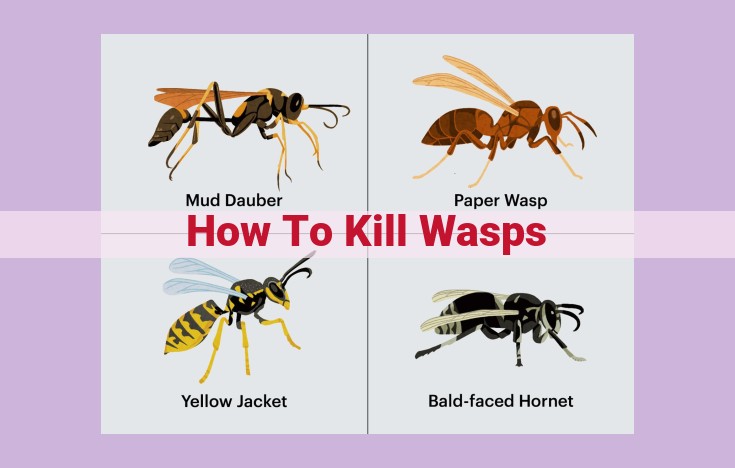Eradicating Wasps: A Comprehensive Guide To Elimination And Prevention

Eliminate wasps swiftly and effectively by employing a multifaceted approach. Utilize traps, repellents, and insecticides to reduce their numbers. Seal potential entry points, eliminate food sources, and maintain a sanitary environment to prevent infestations. Wear protective gear when handling wasps and consider professional pest control services for extensive or persistent problems.
Wasp Control: A Comprehensive Guide to Keep Your Home Pest-Free
Wasps are a common problem for homeowners, but they don’t have to be. With the right knowledge and techniques, you can effectively control wasp populations and keep your family and pets safe.
Types of Wasps
There are many different species of wasps, each with its own unique habits and habitats. Some of the most common types of wasps include:
- Yellow Jackets: These wasps build nests in the ground and are known for their aggressive behavior.
- Paper Wasps: These wasps build nests out of paper and are less aggressive than yellow jackets.
- Mud Daubers: These wasps build nests out of mud and are not typically aggressive.
Wasp Control Methods
There are a variety of ways to control wasp populations. Some of the most effective methods include:
- Traps: Wasp traps are a great way to catch and kill wasps.
- Repellents: Wasp repellents can help to keep wasps away from your property.
- Insecticides: Insecticides can be used to kill wasps, but they should only be used as a last resort.
Wasp Prevention Techniques
The best way to control wasps is to prevent them from infesting your property in the first place. Here are a few tips:
- Seal entry points: Wasps can enter your home through small cracks and crevices. Seal up any holes or gaps around windows, doors, and pipes.
- Remove food sources: Wasps are attracted to food, so it’s important to keep your property clean. Don’t leave food or drinks out overnight, and keep your garbage cans closed.
- Maintain a clean environment: Wasps are also attracted to clutter. Keep your yard clean and free of debris.
Risks of Wasp Stings
Wasp stings can be painful and even dangerous. In some cases, wasp stings can cause allergic reactions, infections, or anaphylaxis. If you are stung by a wasp, it is important to seek medical attention immediately.
Health and Safety Considerations
When handling wasps, it is important to take safety precautions. Wear protective clothing, such as gloves and long sleeves, and be aware of your surroundings. If you are allergic to wasp stings, carry an epinephrine auto-injector with you.
Environmental Impact of Wasp Control
Some wasp control methods can have a negative impact on the environment. For example, insecticides can kill beneficial insects, such as bees. When choosing a wasp control method, it is important to consider the potential environmental consequences.
Professional Wasp Control Services
If you are unable to control wasp populations on your own, you may want to consider hiring a professional pest control company. Professional pest control companies have the experience and equipment to safely and effectively eliminate wasps from your property.
Resources and Related Entities
Knowing where to turn for help with wasp control is crucial. Here are reputable organizations that provide valuable resources and support:
Related Organizations
-
National Pest Management Association (NPMA): This organization offers comprehensive information and training materials on pest control, including wasp management.
-
Environmental Protection Agency (EPA): The EPA provides guidelines and regulations on pesticide use, ensuring the safe and effective control of wasps while minimizing environmental impact.
-
Pest Control Operators of California (PCOC): This state-level organization represents professional pest control companies and provides resources on wasp control practices.
-
University of California, Davis: Their Integrated Pest Management (IPM) Program conducts research and provides educational materials on wasp biology and management.
-
Texas A&M AgriLife Extension Service: This extension service offers science-based information on wasp control, including identification, behavior, and management techniques.